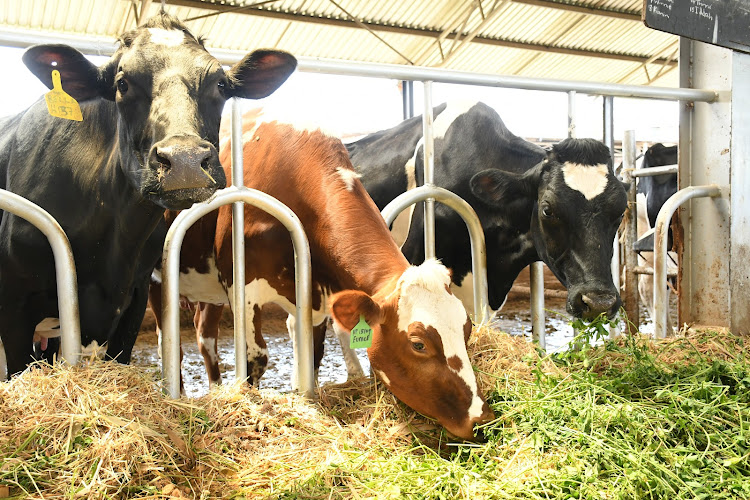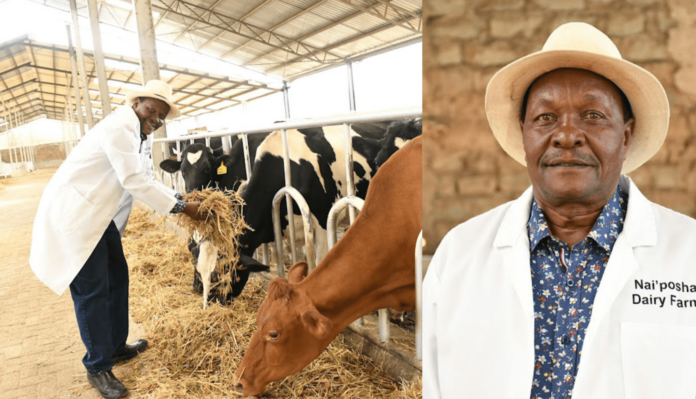When Martin Gatheca relocated from the US to Kenya, he wanted to rear cows ‘just for fun’. For him, it was just a hobby that he didn’t conceive as a potential source of income.
Furthermore, with the well-being of his mother in mind, Gatheca bought cows just to keep his ageing mother busy. Little did he know that he would grow to have a successful dairy enterprise over the course of 7 years.
The seed of dairy farming was sown when Gatheca introduced 3 dairy cows to cater to his mother’s needs in Gatundu, Kiambu County.
The numbers grew to five, ten, twenty and eventually 50. She passed away in 2016, and Gatheca decided to relocate the animals to Naivasha.
“My farm opened its doors commercially in 2016. Initially, we used to do the business casually back at home in Gatundu, Ichaweri village,” he recalled in a past interview.
“To make it a full-time profitable business, I had to move from Gatundu to Naivasha where I had bought a 70-acre piece of land. Before relocating I had only 50 cows,” he said.
Due to the expansive grounds, by 2019, Gatheca’s herd had grown to over 300 dairy cows. He named it Nai’posha Dairy Farm.

During this time, Gatheca understood the profitable business venture he had indulged in ‘as a hobby’. He was now an employer of over 60 people at his dairy farm.
On productive days, his cows would yield up to 1,000 litres of milk, translating to a substantial income of Sh. 50,000, given the Sh. 50 per litre rate.
Out of his milk volume, 700 litres were dedicated to a client who makes cheese. The remaining portion found its way to various hotels in the Naivasha region.
However, the tide of fortune slowly took a turn when the Covid-19 pandemic dawned upon Kenya. Gatheca’s farm was hit hard by the safety protocols the government put in place.
“Right after covid, prices of animal feeds shot from Sh. 1,800 for a 50kg bag of dairy meal to almost Sh. 3,000. Hotels, that were my main customers closed due to the lockdown,” Gatheca remembered.

Subsequently, the feed ratio per animal was reduced to 1.5 kilograms, resulting in a decline in milk production from 40 litres to 22 litres per cow.
He also discontinued his own dairy meal production at the firm, a choice influenced by the low-quality raw materials provided by millers.
He also had to downsize the number of employees from 60 to 20.
“I lost about 40 cows because I was not able to feed them well, and others died due to mastitis and other health-related illnesses. Today I have 150 dairy cows, I am now milking 56 cows from 156 cows,” he said.
With a resolute spirit, Gatheca persevered to ensure the survival of his business venture. However, he expressed his worry about the future of farming in Kenya.
James Ndung’u: Invest in Your Breed If You Want to Reap Big from Dairy Farming
“I hardly make any profits. It is just for the love of the animals and the workers. I am worried that if things continue as they are, I may be forced to close the farm and I don’t know what will happen to the remaining 20 workers,” he said.
Gatheca has urged the government to intervene before many Kenyan farmers are forced to close shop. He says he has travelled to many countries and learned that farmers get subsidies from their governments.
“I have been in India and I learnt that most of their dairy farmers don’t pay for electricity. Electricity and water is free, there are so many subsidies that farmers receive. I also visited Italy and learnt that during winter, their government supplies hay and Lucern grass to the farmers at a subsidised fee,” Gatheca noted








